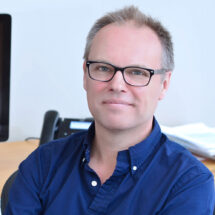
Gero Miesenböck will give the 2018 Francis Crick Lecture on Wednesday 24th October 2018 at 11.00am in the Max Perutz Lecture Theatre at the LMB. The lecture, entitled “Light Sleep” is open to anyone in the local area who is interested in attending.
Gero is Waynflete Professor of Physiology and founding Director of the Centre for Neural Circuits and Behaviour at the University of Oxford. In 2002, Gero established the principles of optogenetic control and thereby defined a new, now widely used, approach for probing the function of the nervous system. He was the first scientist to modify neurons genetically so that their electrical activity could be controlled with light. This involved inserting DNA for light-responsive opsin proteins into the cells. Gero used similar genetic modifications to breed animals whose brains contained light-responsive neurons integrated into their circuitry, and was the first to demonstrate that the behaviour of these animals could be remote-controlled. He continues to use optogenetics in his current research, which centres on the biophysics of temporal information processing in decision-making and the regulation of sleep.
Gero studied medicine at the University of Innsbruck in his native Austria and did postdoctoral research at Memorial Sloan-Kettering Cancer Center in New York. He was on the faculty of Yale University before joining the University of Oxford in 2007.
Gero’s awards for his invention of optogenetics include the InBev-Baillet Latour International Health Prize (2012), The Brain Prize (2013), and the Massry Prize (2016). He was elected a fellow of the Royal Society in 2015, and is a member of the German and Austrian Academies of Science.
Lecture abstract
The Francis Crick Lecture, entitled “Light Sleep,” will illustrate the enabling power of optogenetics with recent work on the homeostatic regulation of sleep. Optogenetic interventions have helped to pinpoint neurons whose sleep-inducing activity switches on as sleep deficits accrue, reveal how this activity switch works, and furnish a molecular interpretation of sleep pressure, its accumulation, and its discharge.
Background information
The Francis Crick Lecture is named in honour of LMB Nobel Laureate Francis Crick. It is one of a series of named lectures organised by the LMB to be given by eminent scientists from around the world.
Francis Crick was born in 1916 in Northampton. He studied physics at University College London. His PhD work was interrupted by World War II, during which he worked on the design of acoustic and magnetic mines for the British Admiralty. In 1949 he joined Max Perutz’s MRC Unit in Cambridge. It was here that he helped solve the structure of DNA and initiated work on the genetic code. In 1976 he moved to the Salk Institute, California. He immersed himself in trying to define how we are aware of things – consciousness. He continued with this until he died, defining the important goal of trying to find a neuronal correlate of consciousness. He died in San Diego on 28 July 2004.
Further references
Gero Miesenböck Lab
Francis Crick LMB Alumni Biography
LMB Named Lectures
Poster for the Lecture